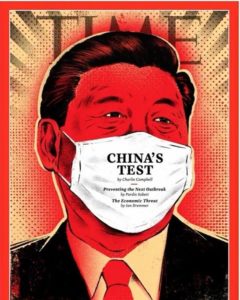
TIME/Twitter
The coronavirus spread from China, but the ruling Communist Party doesn’t want the world spreading it back, notes China’s Communist Party appears mindful that other governments might lack the techno-authoritarian tools to shut down the spread like it did, she writes for The Washington Post. Authorities are taking measures to prevent people who have traveled to new hotspots — South Korea, Iran, northern Italy and Japan — from bringing the disease back.
Unfortunately, this crisis occurs in a dark political climate, more similar to that of the early ’30s, when many governments pursued nationalist, beggar-thy-neighbor policies and international cooperation was very limited, according to Thomas Wright, Senior fellow at the Brookings Institution, and Kurt M. Campbell, former Assistant Secretary of State for Asia and the Pacific. Over the past decade, the world has grown more authoritarian, nationalistic, xenophobic, unilateralist, anti-establishment, and anti-expertise. The current state of politics and geopolitics has exacerbated, not stabilized, the crisis, they write for The Atlantic.
As a new study from The Economist reveals, dictatorships are bad for public health, ” Alex Gladstein (@gladstein), the chief strategy officer of the Human Rights Foundation, observes. Democracies, their analysis concludes, are “better than other forms of governments at containing and treating outbreaks … [experiencing] lower mortality rates for epidemic diseases than their non-democratic counterparts.”
Epidemics reveal the truth about the societies they hit, argues National Endowment for Democracy (NED) board member Anne Applebaum.  Case in point……
Case in point……
Electoral democracy under corona virus: on March 2, Israel had elections with special ballots for thousands of Israelis under quarantine due to concerns of possible exposure to the corona-virus. Quite amazing! Yaniv Roznai observed on Facebook. (HT: Amichai Magen).
The Indian Nobel Prize–winning economist Amartya Sen famously wrote [in Development as Freedom] that no famine had ever occurred in a democracy. Open societies allow for a free flow of information and independent inquiry and investigative journalism, and these forces are equally effective at warning and spreading word about emergency lack of food as they are at alerting about outbreaks, Gladstein writes for WIRED magazine:

Human Rights Foundation
One of the lessons of coronavirus should be that authoritarian systems are an increasingly significant threat to our world. As Iran analyst and human rights lawyer Gissou Nia recently said, “The next time someone tries to downplay the abuses of a dictatorship or say ‘it’s none of our business,’ please point them to the handling of Covid-19. We are all interconnected and how states handle their ‘internal’ affairs affects us all.” Martin Luther King Jr.’s maxim that “injustice anywhere is a threat to justice everywhere” has never rang more true….
At first glance, highly centralized dictatorships may seem better equipped to mobilize quickly during an epidemic, since they simply don’t respect the rights or wishes of citizens in their plans. One could view the Chinese Communist Party’s enormous amount of new construction and requisition in their race to build more hospitals, more beds, and more testing facilities as a positive thing. But because of the climate of fear they create in order to survive, tyrannies end up flustering innovation and cooperation, and ultimately treat even well-intentioned criticism as a crime against the state.
In closed societies, regimes target and punish the bravest citizens, instead of allowing them to lead and help with public health crises, Gladstein adds. These creative and innovative individuals are the white blood cells of our global immune system, identifying risks, sharing information about threats, and keeping us strong and healthy. RTWT







